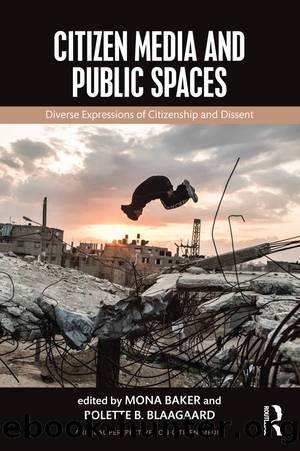Citizen Media and Public Spaces (Critical Perspectives on Citizen Media) by Mona Baker and Bolette B. Blaagaard

Author:Mona Baker and Bolette B. Blaagaard
Language: eng
Format: azw3
ISBN: 9781317537502
Publisher: Taylor and Francis
Published: 2016-06-09T16:00:00+00:00
Subtitling The Power of Nightmares
This section aims to explore further how affect plays out in the context of activist subtitling networks. Due to space limitations, I will not address the manifestations of affect in the semiotics (understood as the verbal and non-verbal dimensions) of the subtitles produced by these self-mediation practices. Rather than looking at the encoding of inter-subjectivity in the translations,4 I intend to gauge the contribution of affect to the processes of deliberation that unfold within radical subtitling communities, including those conducive to the assembling of an audience of affective receptivity. For the purposes of illustration, I discuss how affective structures mediate the relationship between the actual and the virtual, where a collectivity of activist subtitlers and progressive citizens emerges during the prosumption of a Spanish language version of the three-episode BBC documentary The Power of Nightmares.
Originally broadcast in October 2004, at a time when the US and its allies were positioned on the frontline of the global ‘War on Terror’ launched after the devastating attack on the World Trade Center on 11 September 2001, The Power of Nightmares aimed to expose how American neo-conservatives were narrating ‘the radical Islamists in the image of their [America’s] last evil enemy, the Soviet Union – a sinister web of terror run from the centre by Osama Bin Laden in his lair in Afghanistan’.5 Writing for The Guardian in 2004, feature writer Beckett argued that
the central theme of The Power of Nightmares is riskily counter-intuitive and provocative. Much of the currently perceived threat from international terrorism, the series argues, ‘is a fantasy that has been exaggerated and distorted by politicians. It is a dark illusion that has spread unquestioned through governments around the world, the security services, and the international media.’ The series’ explanation for this is even bolder: ‘In an age when all the grand ideas have lost credibility, fear of a phantom enemy is all the politicians have left to maintain their power’.
The documentary’s claim that the perceived threat of Islamist terrorism was (is) a politically driven narrative6 proved very controversial – particularly, though not exclusively – among US viewers. Excerpts 1–3 illustrate the wide-ranging, often emotionally heated reactions of viewers posted on a dedicated page on the BBC website:7
Excerpt 1
I have not seen the moronic film. As an American I am sick and tired of the DREAMING Liberals WORLDWIDE and that includes, you Euros. You had better wake up and quit your dreaming. Reality is, there is a World Wide Holy War going on. We, the Americans did not start it. The Terrorist did, but We, since you spineless others don’t have the guts to do so, WILL FINISH IT, just like all the other times we have had to save your butts.
Paul Herrmann, Kinsport, TN, USA
Excerpt 2
It’s hard for me to say the threat isn’t there. My friend’s brother died in the South Tower and my husband and I found ourselves running for our lives on 9/11 caught in that terrifying cloud as the first tower went down.
Download
This site does not store any files on its server. We only index and link to content provided by other sites. Please contact the content providers to delete copyright contents if any and email us, we'll remove relevant links or contents immediately.
| Anthropology | Archaeology |
| Philosophy | Politics & Government |
| Social Sciences | Sociology |
| Women's Studies |
Cecilia; Or, Memoirs of an Heiress — Volume 1 by Fanny Burney(32558)
The Great Music City by Andrea Baker(32018)
Cecilia; Or, Memoirs of an Heiress — Volume 2 by Fanny Burney(31956)
Cecilia; Or, Memoirs of an Heiress — Volume 3 by Fanny Burney(31941)
We're Going to Need More Wine by Gabrielle Union(19046)
All the Missing Girls by Megan Miranda(16026)
Pimp by Iceberg Slim(14506)
For the Love of Europe by Rick Steves(14121)
Bombshells: Glamour Girls of a Lifetime by Sullivan Steve(14075)
Talking to Strangers by Malcolm Gladwell(13370)
Norse Mythology by Gaiman Neil(13363)
Fifty Shades Freed by E L James(13240)
Mindhunter: Inside the FBI's Elite Serial Crime Unit by John E. Douglas & Mark Olshaker(9342)
Crazy Rich Asians by Kevin Kwan(9292)
The Lost Art of Listening by Michael P. Nichols(7506)
Enlightenment Now: The Case for Reason, Science, Humanism, and Progress by Steven Pinker(7313)
The Four Agreements by Don Miguel Ruiz(6765)
Bad Blood by John Carreyrou(6621)
Weapons of Math Destruction by Cathy O'Neil(6279)
